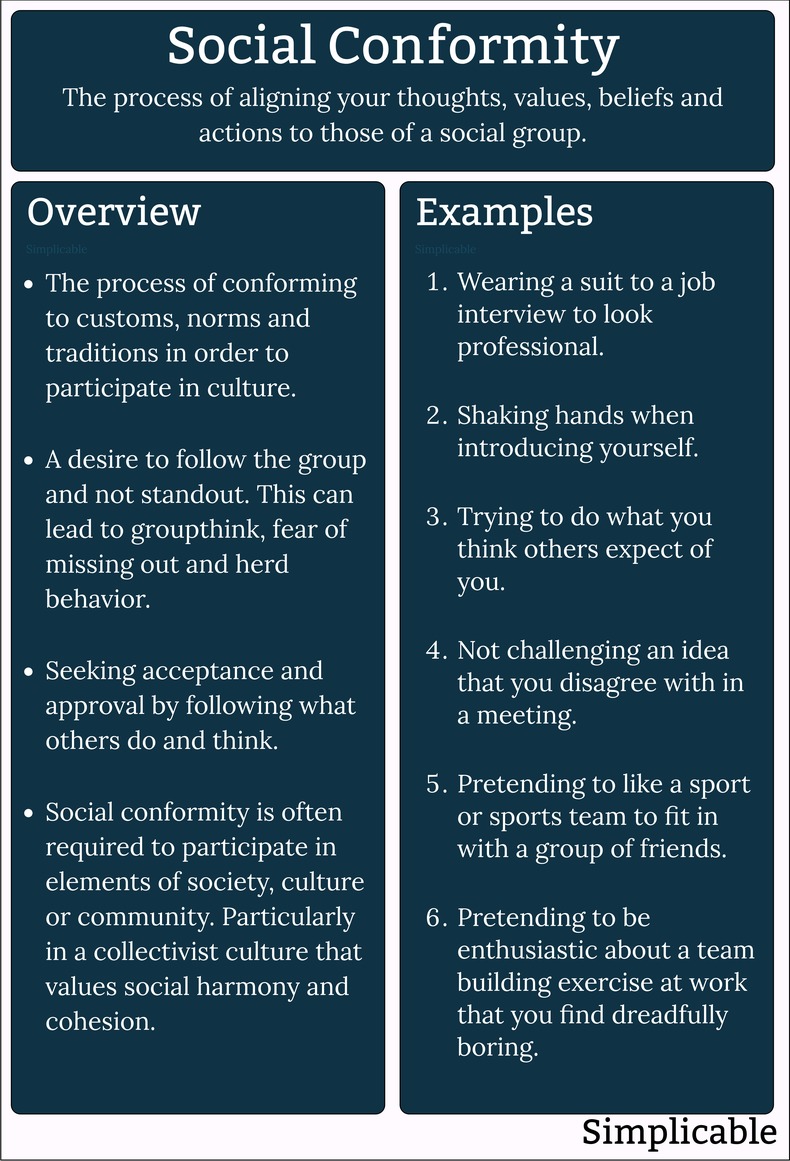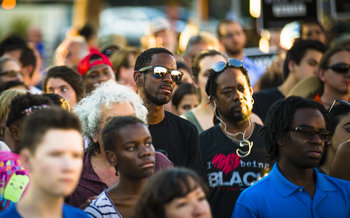
Laughing at a joke you don't find funny because everyone else is laughing. | Dressing similarly to your peers to fit in. |
Agreeing with a group decision you think is a bad idea to avoid standing out. | Clapping with the crowd when you didn't enjoy a performance. |
Saying what you think others will agree with as opposed to what you think. | Not voicing unpopular opinions to avoid backlash. |
Joining a protest or demonstration because everyone is doing it. | Remaining silent or joining in when a classmate is bullied. |
Buying the model of phone that everyone else buys to avoid standing out. | Going to university because your peers are going. |
Pretending to like a popular celebrity when you don't. | Obsessing about the condition of your lawn for fear of what the neighbors might think. |
Eating something you normally prohibit in your diet to fit in at a dinner party. | Rushing to the exit that everyone is using in an emergency. |
A strong desire to purchase expensive brands after you realize your classmates own them. | Saying that you dislike a political candidate who is unpopular amongst your peers when you secretly admire them. |
Saying things in social media to try to gain approval as opposed to saying what you think. | Piling on to criticize what everyone seems to be criticizing. |
Upgrading your car every three years because that's what your neighbors do. | Fear of missing out whereby you follow trends because they are popular. |
Shaping your identity to fit the social expectations others have of you. | Using trendy slang to sound cool. |
Fear of sharing content that isn't already viral. | Mimicking behaviors to try to fit in. |
Passionately cheering for local sports teams when deep down you find sports boring. | Not showing emotions that you fear others might see as abnormal. |
Shaping your behavior to try to obtain validation from others. | Trying to fit in so hard that you fail to express your own personalty. |
Strictly aligning to a corporate culture and criticizing or sidelining those who do not. | A tendency to choose sides and to always side with the more popular side. |
Worrying more what others think than what you think yourself. | Trying to stay away from anything or anyone who you perceive as unpopular. |
Trying to do what is expected of you. | Fear of individualists who challenge the group. |
Counterexamples
Counterexamples of social conformity aren't always obvious. For example, you can participate in popular things because you value them as opposed to out of a desire to fit in. Likewise, you could follow an alternative lifestyle while pushing hard to conform to the norms of such a lifestyle. Counterexamples of social conformity are when you do things to pursue your goals and express yourself as an individual without concern for what others are thinking.Liking a popular film because it was good. | Following a fashion trend because you think it's interesting and stylish. |
Participating in pop culture such as theme parks because you enjoy them. | Resisting peer pressure to eat a particular food. |
Challenging the assumptions of your team in a meeting. | Voicing your opinion even if it is unpopular. |
Standing up for someone who is being bullied. | Pursuing your authentic self regardless of what people think. |
A tendency to go your own way and define your own way of living. | Adhering to a tradition because you value a culture and the connections to the past that it represents. |
Collectivism vs Individualism
Collectivism is a culture or ideology that values common goals. This demands a high level of social conformity whereby social harmony and cohesion is valued. Individualism is a culture that values individual expression and being yourself. This allows for greater freedom to challenge the group and is associated with lower levels of conformity.Discussion
Social conformity isn't inherent bad or good but it depends on the situation. For example, if you're conforming to be polite or to follow a worthy custom or tradition this can help to build and sustain relationships with others and to participate in culture. Social conformity can also be used in shallow ways to seek social status by embracing the popular and shunning the unpopular. It can also create unproductive situations such as groupthink or unthinking herd behaviors that create problems and risks. For example, a team that follows a strategy everyone knows is going to fail but nobody wants to standout by challenging it.Summary
Social conformity is the process of aligning your behavior and thinking to others in a group. This is a common and foundational social behavior that includes everyday things such as being polite and conforming to the norms of a culture. Social conformity also includes behaviors that are viewed as shallow or irrational such as pretending to be someone you are not or supporting ideas with which you disagree in order to fit in.























